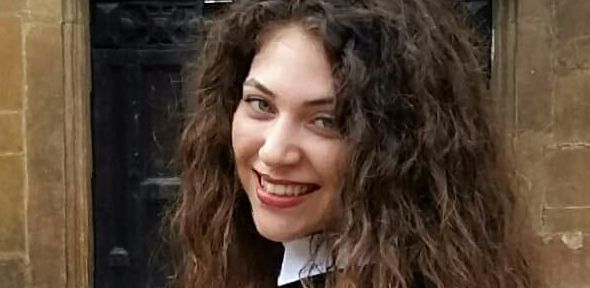
Faculty of Modern and Medieval Languages and Linguistics Raised Faculty Building University of Cambridge Sidgwick Avenue Cambridge CB3 9DA United Kingdom
- SLA3: Introduction to Russian Culture
- SL14: Russian Culture from 1895 to the Death of Stalin
- SL6: Russian Culture after 1953 (Optional Dissertation)
In my current research project, I set out to examine the relationship between bodiliness (telesnost’) and text (tekst), which the writer Vladimir Sorokin (1955-) claims to be central to his works. I situate Sorokin’s literary works and playscripts produced during the 1980s and 1990s in the unofficial artistic circle of Moscow Conceptualism, in which he was actively participating throughout the 1980s. By deploying a close-reading analysis, I compare Sorokin’s works with contemporaneous literary texts by Dmitrii Prigov and Andrei Monastyrskii and performances by Collective Actions (KD) and the group Mukhomor in order to understand how bodiliness, as expressed in emotions and sensations, operates in the collective consciousness of Moscow Conceptualism. Drawing on theories on performative utterances, affect and reader-response, I specifically look at how the Moscow Conceptualist artworks depict the effect that visual, aural, haptic and olfactory qualities (i.e. materiality) of texts have on the audience’s body and, vice versa, the effect that the writers’ or artists’ bodies have on the texts that they produce. By using the relationship between bodiliness and text as a lens, I therefore aim to understand how Moscow Conceptualism intervenes in the conceptualisation of creation and reception of texts, especially in the Russian and Soviet context. How does Moscow Conceptualism react to the official Soviet understanding of art as a tool for cultivating Soviet consciousness and, by extension, how does Moscow Conceptualism imagine the role of bodiliness in the process of assuming an identity?
Conference Papers:
- “Diary of a Madman: In search of a language to describe mental illness in Andrei Monastyrskii’s Kashirskoe shosse”, American Comparative Literature Association Annual Meeting (Virtual), April 2021 – accepted.
- “The dysmorphomanic language in Vladimir Sorokin’s works”, Literary Arts and Health Humanities: Today and Tomorrow, Banff Centre for Arts and Creativity, Canada, AB, April 2020 - postponed.
- “Turning the reader into a spectator: Textual bodies in Vladimir Sorokin’s and Dmitrii Prigov’s works”, British Association for Slavonic and East European Studies Annual Conference 2020, Robinson College, University of Cambridge, April 2020 - postponed.
- “Reconceptualising Commedia dell’arte: Theatre as a tool for social integration”, British Academy Rising Star Workshop: “Exclusion, Marginalisation, Othering: how can the arts respond?”, The British Academy/St John’s College, University of Cambridge, March 2020.
- “Commedia dell’arte in Russian culture”, The legacy of Commedia dell’arte in European Theatre Workshop, University of Cambridge, November 2019 and February 2020.
- “Turning the reader into a spectator in Dmitrii Prigov’s and Vladimir Sorokin’s works”, The Institute of Modern Languages Research Forum, University of London, November 2019.
- “Fleshing out cruelty on page: Literary bodies in the works of Vladimir Sorokin”, The Cultural Language(s) of Pain: European Literary Perspectives, The Institute of Modern Languages Research, University of London, November 2018.
Awards:
- CEELBAS AHRC Centre for Doctoral Training (CDT) in Russian, Slavonic and East European Languages and Cultures Scholarship
- Cambridge Trust European Scholarship
- Jesus College Hogwood Scholarship (Cambridge)
Languages (in addition to English):
Greek (native), Russian (native), Spanish (Intermediate -B2) German (Basic -A2), Ancient Greek (Reading), Latin (Reading).


